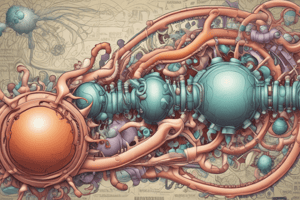Podcast
Questions and Answers
يتم هضم الكربوهيدرات والبروتينات والدهون في الأمعاء الدقيقة فقط.
يتم هضم الكربوهيدرات والبروتينات والدهون في الأمعاء الدقيقة فقط.
False (B)
تزيد الزغابات (الفيلي) في الأمعاء الدقيقة من مساحة امتصاص المغذيات.
تزيد الزغابات (الفيلي) في الأمعاء الدقيقة من مساحة امتصاص المغذيات.
True (A)
تستغرق عملية الهضم بين $24$ و $72$ ساعة دائمًا بغض النظر عن نوع الطعام.
تستغرق عملية الهضم بين $24$ و $72$ ساعة دائمًا بغض النظر عن نوع الطعام.
False (B)
يتم تكوين البراز في الأمعاء الغليظة نتيجة امتصاص الماء.
يتم تكوين البراز في الأمعاء الغليظة نتيجة امتصاص الماء.
تقوم البكتيريا في الأمعاء الغليظة بتحليل الدهون المتبقية.
تقوم البكتيريا في الأمعاء الغليظة بتحليل الدهون المتبقية.
ما هي وظيفة الفتحة المريئية البوابية؟
ما هي وظيفة الفتحة المريئية البوابية؟
ما هو الغرض من حركات عضلات المعدة؟
ما هو الغرض من حركات عضلات المعدة؟
ما هو الخليط شبه السائل الذي يتكون في المعدة ويمر إلى الأمعاء الدقيقة؟
ما هو الخليط شبه السائل الذي يتكون في المعدة ويمر إلى الأمعاء الدقيقة؟
ما هي العملية التي تحدث في الأمعاء الغليظة؟
ما هي العملية التي تحدث في الأمعاء الغليظة؟
ما هي بعض المشاكل الشائعة التي تصيب الجهاز الهضمي؟
ما هي بعض المشاكل الشائعة التي تصيب الجهاز الهضمي؟
Study Notes
Understanding Digestion: From the Mouth to the Rectum
The process of digestion is crucial for humans to derive essential nutrients from the food consumed. It involves various organs working together to break down food into smaller components for efficient absorption and utilization by the body. Here's a comprehensive overview of the process, covering everything from the initial stages in the mouth to the final elimination of waste products.
The Process of Digestion
Digestion consists of two main processes: mechanical digestion and chemical digestion. Mechanical digestion refers to the physical breakdown of food into smaller pieces, making it easier to process. This occurs mainly in the mouth and stomach. Chemical digestion, on the other hand, involves the breakdown of food molecules using specialized enzymes. Both processes are essential for efficient nutrient extraction and recycling.
Beginning in the Mouth
Digestion commences in the mouth. Teeth break down solid food into smaller pieces, while saliva moistens it and adds an enzyme called amylase. Amylase initiates the breakdown of carbohydrates into simpler sugars, making them easier to swallow.
Transition to the Stomach
After leaving the mouth, food travels down the esophagus into the stomach. The stomach contains hydrochloric acid and enzymes that continue the process of chemical digestion. Hydrochloric acid creates a highly acidic environment, facilitating the activation of other digestive enzymes, such as pepsins, which further break down proteins into smaller peptides and amino acids. The partially digested material, now called chyme, leaves the stomach and proceeds to the small intestine.
Small Intestine Action
In the small intestine, chyme meets additional enzymes released by the pancreas and liver. These enzymes digest carbohydrates, proteins, and fats. Bile from the liver emulsifies fats, allowing pancreatic enzymes to act effectively. The small intestine also houses millions of finger-like projections called villi, which increase the surface area for absorption. Nutrients are taken up into the bloodstream via the villi's surrounding capillary network.
Role of the Large Intestine
The remaining waste from digestion passes to the large intestine, where bacterial fermentation breaks down certain carbohydrates. Water is absorbed, resulting in the formation of feces. Feces are temporarily stored in the rectum until expelled through the anus.
Factors Affecting Digestion Time
The length of time it takes for food to be digested depends on several factors, including the type and amount of food consumed, presence of digestive issues like gastrointestinal diseases, and individual variations in digestive efficiency. Generally, the process can take between 24 to 72 hours, although this may vary for different individuals and food types.
Studying That Suits You
Use AI to generate personalized quizzes and flashcards to suit your learning preferences.
Description
Explore the comprehensive process of digestion in humans, from the initial stages in the mouth where food is broken down and enzymes are introduced, to the final elimination of waste in the rectum. Learn about mechanical and chemical digestion, the role of different organs, and factors affecting digestion time.




